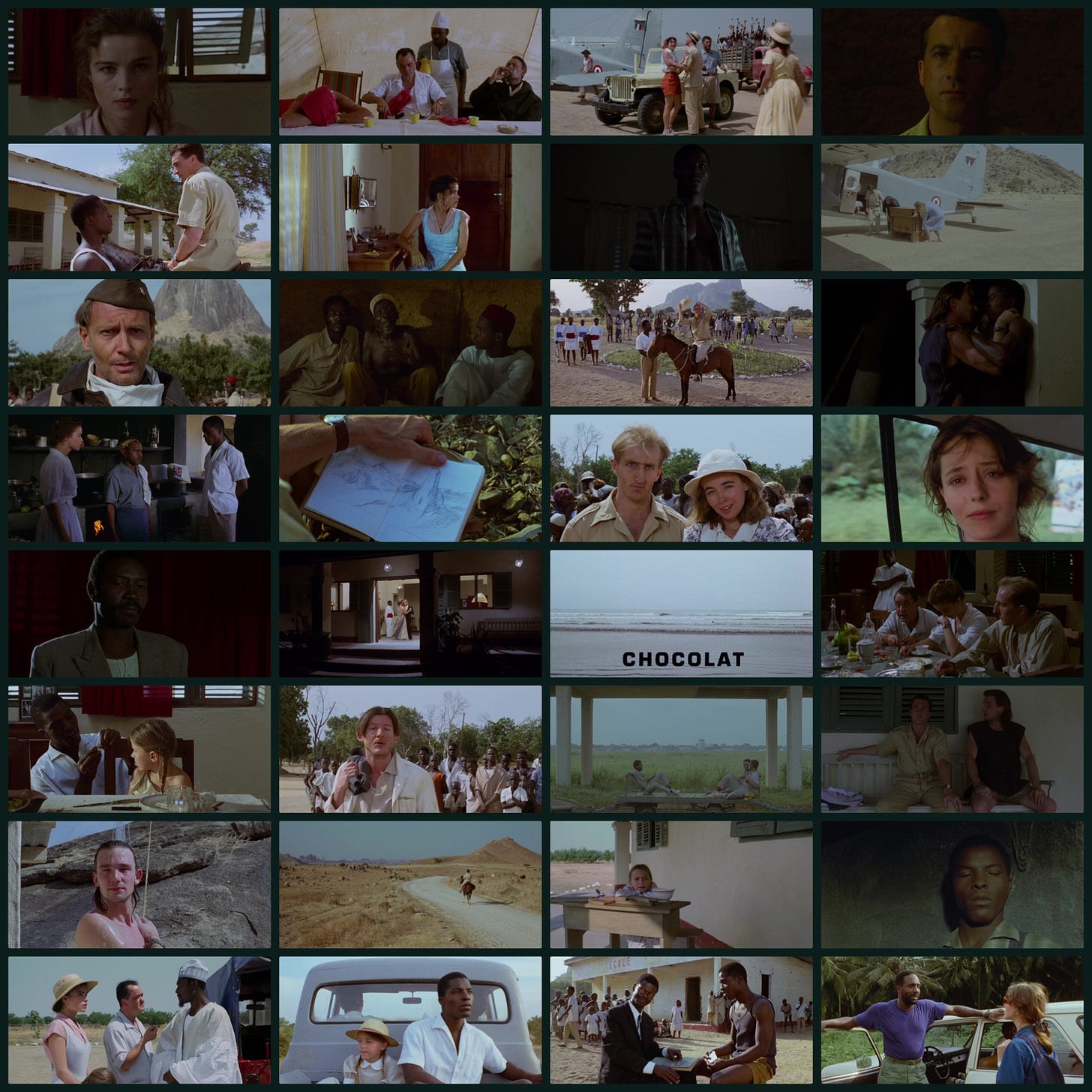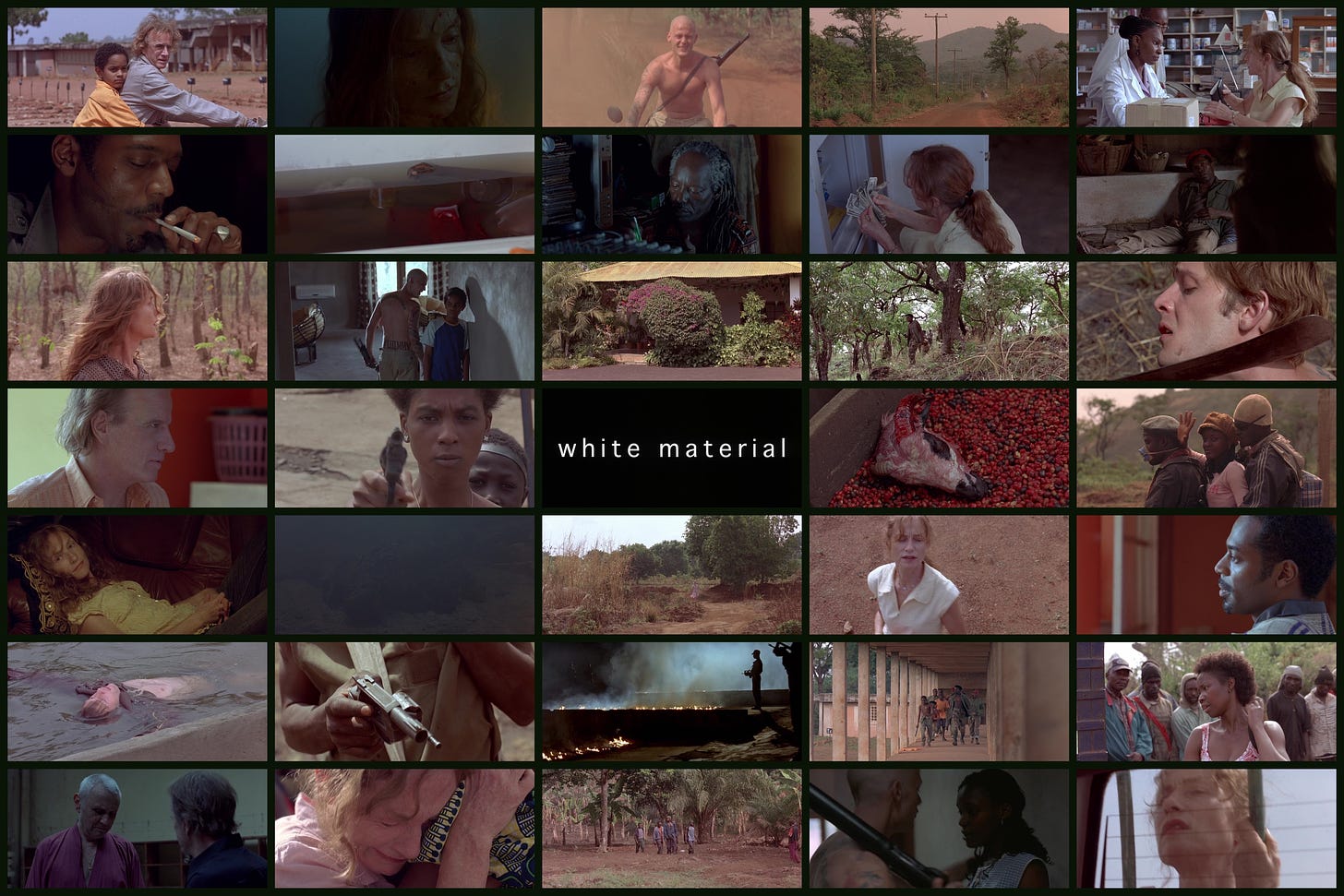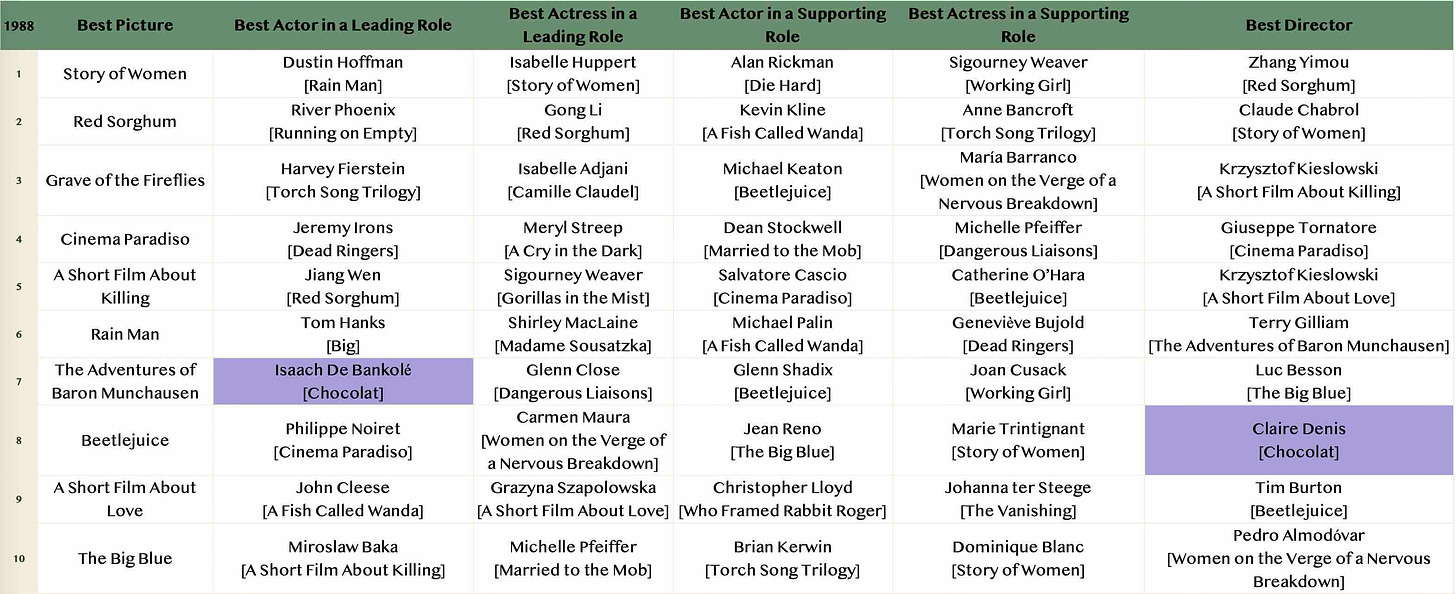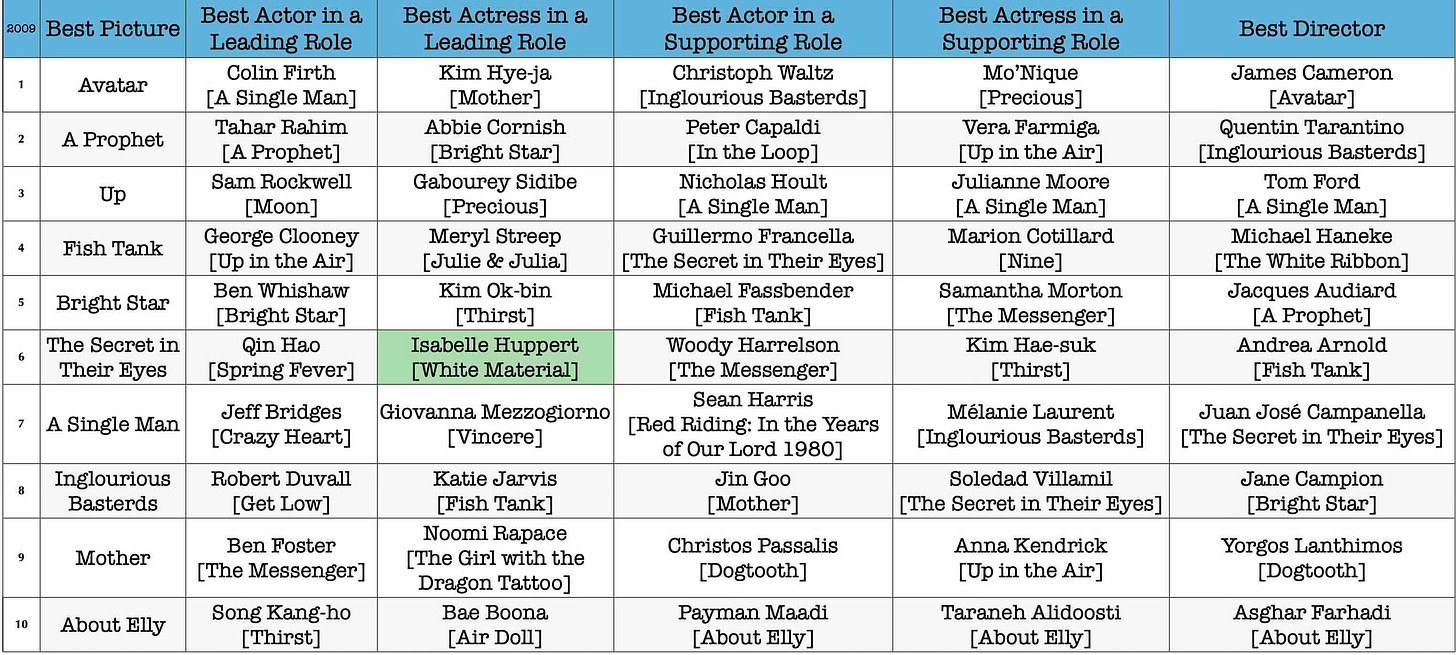French cinema doyenne Claire Denis (1946-) was raised in colonial French Africa, and naturally this unique upbringing and experiences can be mirrored in her corpus. Principally, her debut feature CHOCOLAT, a semi-autobiographical account of her memory lane and two decades later, WHITE MATERIAL, her collaboration with an indomitable Isabelle Huppert mired in a post-colonial cul-de-sac. Prompted by the overt chromatic references in both titles, the two films fittingly comprise a diptych, an intriguing and fine-grained postmortem of French colonization’s racial tension and psychological pathologies in the African lands.
CHOCOLAT starts with a frame story about a young woman France (Perrier) returning to Cameroon to revisit Mindif, then segues into a reminiscence of her childhood days there in the 1950s. Her father Marc (a handsome, temperate Cluzet) is a French administrator, a preteen France (Ducasse) spends most of her time with her mother Aimée (Boschi, beguiling inscrutable), and their houseboy Protée (Bankolé), a beautifully virile young man in his prime.
France is very close to Protée, and their interactions often breach formality (sharing a piece of bread roaming with ants?). But so is Aimée, who often is left alone to field the quotidian domesticity while Marc is elsewhere for his official missions. Yet, as adults, the breaching of the master-and-servant boundary is more covert. Aimée making out with Marc in front of Protée is a subtle form of seduction, and Protée's distress after believing that Aimée has seen him take a shower in the buff is a protestation of being stripped of his remaining dignity (of which one's birthday suit is the last resistance) in the colonized/colonizer symbiosis. Protée is a servant, but he holds his head high, does his job professionally, minds his own business, refuses being bossed around. Bankolé does a strikingly memorable job to pocket Protée's displeasure, retain his dignity but not sacrificing his beneficent nature. When Aimée eventually succumbs to her desire, it is Protée’s chance to earn back his dignity, if not a brighter future.
The prickly racist undertows are tactfully lensed through France’s standpoint, stirred by a sundry of white characters who transiently beds down in France's home. Among which, Jacques Denis's coffee plantation owner is a repugnant loudmouth; Adelin's Luc appears as an airy wanderer, more than happy to sleep rough and share comestibles with the indigenes. When a medical emergency triggers the French's intrinsic distrust of the Africans, their subordinates, Luc is the first to mock their hypocrisy and egotism, but even for him, a line in the sand is drawn before an interracial affair. Denis and Fargeau's script is surgical enough to get to the point but leaves no wiggle room for hyperbole, because Denis never dwells on sentimentality, her editing pace is neat, almost rough-hewn, doesn't conform to the syntax of dramaturgy, which requests the narrative to be built with suspense, tension and drama to hook the audience.
Denis' arbitrary but slashing stylization of her storytelling, uncanny sensibility to the locations, become more evident 20 years later in WHITE MATERIAL, an unofficial sequel, where Huppert's Maria Vial oversees a coffee plantation in an unnamed African country caught in the crosshairs of a rampant civil war between the rebels and the government, in the post-colonial era of the noughties. Disrupting the temporal sequentiality and offering no indicators, the film plunges audience directly into the scramble, showing the aftermath (a way to deaden the dread that pervades the entire film) at the outset, then jumping back and forth to piece together the main topos of Maria's crusade to keep the business as usual, obstreperously ignoring all the warnings (including a bloody goat head) and exhortations to take a powder.
Honing in on Huppert's salient presence - whose petite, slender figure emanates an indefatigable vitality in perpetual movements and application. Her resolve is frantic on the inside and icily stolid on the outside. Not until near the end, she finally cracks up in a stranger's arms, only to go mental and murderous after everything she holds dear is spifflicated - WHITE MATERIAL, whose title is local African's slang for the white folk, continues and further probes the feelings of alienation and insecurity on foreign soils tapped in CHOCOLAT. The home which Maria proclaims hers isn't really hers in a lawless disarray where white privilege is dismantled. Any individual's life is expendable, and no one can guarantee to be spared (the unsettling slaying of the insensate child soldiers is executed with a delicate fashion that leaves viewers silently quiver with inhumanity on display).
The vestige of colonialism has no sway on the African people anymore, flee or stay, on which Maria's employees decide solely by their autonomy. There is no "loyal" servants to throw in their lots with their pale-skinned masters. And Manuel (Duvauchelle), the listless, molly-cuddled son of Maria and her ex-husband André (Lambert), is the epitome of white redemption, ultimately paying for the crime committed by his forebears in conflagration.
Music are often sparsely used in Denis’ films, but Abdullah Ibrahim’s jazz-inflected enchantment in CHOCOLAT is such an exquisite balm for her remembrance of her own past, against the ceaseless whirring of generators, whereas the humming, limpid, mood-setting score from Stuart Staples, the co-founder of British indie band Tindersticks, is anomalously dulcet when a band of gun-toting child soldiers maunders into the foreground, and becomes a strange bedfellow of the film’s dust-and-earth imagery.
Through both films, Denis sticks to her political leanings adamantly. Emotions are internalized, personalities are de-centered, or discolored, only to reveal the bare-bones conflict that is borne out of bigotry, supremacy, exploitation on one side, benightedness, irrationality and odium on the other side. Even if it befalls belatedly upon a perpetrator’s offspring, there will always be a payback for every crime, because the savagery residing in humanity is fathomless and primordial. As if we can hear her clear-headed plea“before knowingly committing a crime, please think twice, if not for yourself, please think of your children, think of the future.”ergo, Denis’ voice shall never be brushed aside.
referential entries: Denis’s BEAU TRAVAIL (1999, 8.0/10); Cary Joji Fukunaga’s BEASTS OF NO NATION (2015, 7.9/10).
Title: Chocolat
Year: 1988
Genre: Drama
Country: France, Cameroon, West Germany
Language: French, Hausa, English, Arabic
Director: Claire Denis
Screenwriters: Claire Denis, Jean-Pol Fargeau
Music: Abdullah Ibrahim
Cinematography: Robert Alazraki
Editors: Monica Coleman, Claudine Merlin, Sylvie Quester
Cast:
Isaach De Bankolé
Giulia Boschi
François Cluzet
Cécile Ducasse
Mireille Perrier
Jean-Claude Adelin
Didier Flamand
Laurent Arnal
Emmanuelle Chaulet
Jean-Quentin Châtelain
Kenneth Cranham
Jacques Denis
Emmet Judson Williamson
Jean Bediebe
Essindi Mindja
Saïdou Abatcha
Rating: 7.8/10
Title: White Material
Year: 2009
Genre: Drama, War
Country: France, Cameroon
Language: French
Director: Claire Denis
Screenwriters: Claire Denis, Marie N’Diaye, Lucie Borleteau
Music: Stuart Staples
Cinematography: Yves Cape
Editor: Guy Lecorne
Cast:
Isabelle Huppert
Christopher Lambert
Nicolas Duvauchelle
Michel Subor
Isaach De Bankolé
William Nadylam
Adèle Ado
Ali Barkai
Daniel Tchangang
Rating: 7.7/10







